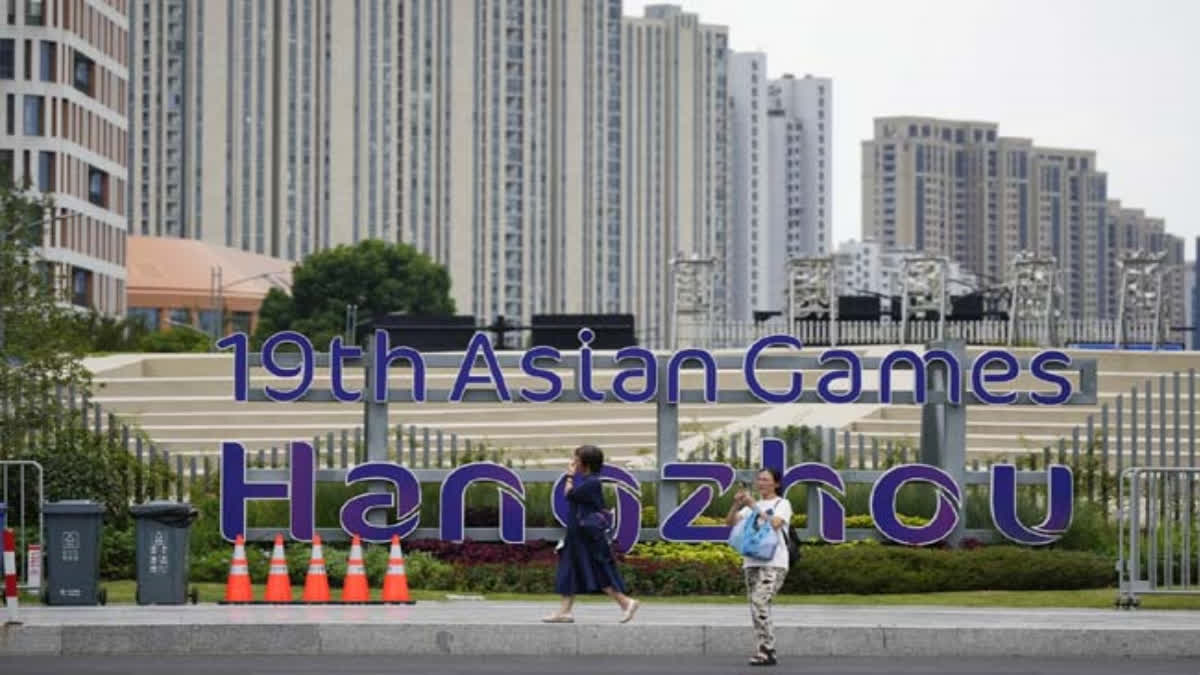New Delhi: Yet again, athletes from Arunachal Pradesh have been barred from participating in a sporting event in China. This time it is no less than the 2023 Asian Games in Hangzhou. Nyeman Wangsu, Onilu Tega and Mepung Lamgu, the three wushu players from Arunachal Pradesh, did not get their accreditation cards from the Hangzhou Asian Games Organising Committee, which also serves as an entry visa. The athletes are then required to download their travel documents, which are validated upon arrival.
India has protested strongly saying that it “firmly rejects differential treatment of Indian citizens on the basis of domicile or ethnicity”. “The Government of India has learnt that the Chinese authorities have in a targeted and pre-meditated manner discriminated against some of the Indian sportspersons from the state of Arunachal Pradesh by denying them accreditation and entry to the 19th Asian Games in Hangzhou, China,” External Affairs Ministry spokesperson Arindam Bagchi said in a statement. “In line with our long-standing and consistent position, India firmly rejects differential treatment of Indian citizens on the basis of domicile or ethnicity. Arunachal Pradesh was, is and will always remain an integral and inalienable part of India.”
Bagchi also said that Minister for Youth Affairs and Sports Anurag Thakur has cancelled his scheduled visit to China for the Games as a mark of protest. Minister for Earth Sciences and Lok Sabha MP from Arunachal Pradesh Kiren Rijiju also condemned the action by China. “I strongly condemn this act by China to deny visas to our wushu athletes from Arunachal Pradesh, who were to participate in the 19th Asian Games in Hangzhou. This violates both the spirit of sports and also the rules governing the conduct of Asian Games, which explicitly prohibits discrimination against competitors from member states,” Rijiju posted on X.
“Arunachal Pradesh is not a disputed territory, but an inalienable part of India. The entire people of Arunachal Pradesh resolutely oppose any illegal claim of China on its land and people. International Olympic Committee should reign in China's illegitimate action.” With China claiming Arunachal Pradesh to be a part of what it calls the South Tibet region, this is not the first time that athletes from the northeastern state have not been able to participate in sporting events in India’s northern neighbour.
A couple of months ago, three players from Arunachal Pradesh were issued stapled visas by the Chinese Embassy for the World University Games in Chengdu. Following this, the entire 12-member Indian wushu team called off the trip. A stapled visa is an unstamped piece of paper attached to a passport with staples or a pin. Unlike regular visas that are affixed and stamped directly on the passport, stapled visas are detachable. The issuance of stapled visas is part of China’s ongoing territorial disputes with India over Arunachal Pradesh. China claims that such visas are valid documents but India has consistently refused to accept this position.
Issuing stapled visas to Indian nationals from Arunachal Pradesh and Jammu and Kashmir is part of China’s efforts to undermine India’s sovereignty over these regions. China’s actions are seen as attempts to challenge India’s control and authority over parts of its own territory. According to former foreign secretary Vijay Gokhale, Chinese state-run media started referring to Arunachal Pradesh as South Tibet from 2005 onwards. South Tibet is a literal translation of the Chinese term Zang Nan. According to Gokhale, an Indian government official serving in Arunachal Pradesh was denied a visa by China in 2006. After that, China started the practice of issuing stapled visas.
In 2011, five karatekas from Arunachal Pradesh were issued stapled visas for participating in an event in China. The same year, an Indian Weightlifting Federation official and a weightlifter from Arunachal Pradesh were issued stapled visas to participate in a grand prix event in China. Then again in 2011, two archers from Arunachal Pradesh were issued stapled visas for participating in the Youth World Archery Championships in China. All these people had to forego their plans as authorities at Indian airports and security personnel do not accept stapled visas as valid travel documents.
China disputes India’s sovereignty over Arunachal Pradesh and challenges the legitimacy of the McMahon Line, the boundary between Tibet and British India, agreed upon in the Simla Convention of 1914. Following this agreement, the Tawang region and the southern part of Tibet were considered to be a part of British India. The disagreement over the Line of Actual Control (LAC) lies at the heart of Chinese claims on the disputed territory and leads to repeated transgressions into Indian territory. China claims that the Chinese delegate Ivan Chan was not an authorised member during the McMahon Line negotiation.
Last month, Beijing released a new standard China map wherein India’s Arunachal Pradesh and Akshai Chin and disputed South China Sea were again shown as parts of Chinese territory. India, along with nine other countries, including those in Southeast Asia, rejected the map. Speaking at a panel discussion on China’s new map earlier this week, Pooja Bhatt, author of the book Nine-Dash Line: Deciphering the South China Sea Conundrum, said that China keeps releasing such maps for posterity and normalisation of its narrative for domestic consumption. “Another reason is bolstering Chinese President Xi Jinping’s waning legitimacy,” Bhatt said. “The map is part of an expansionist and misleading narrative.”
